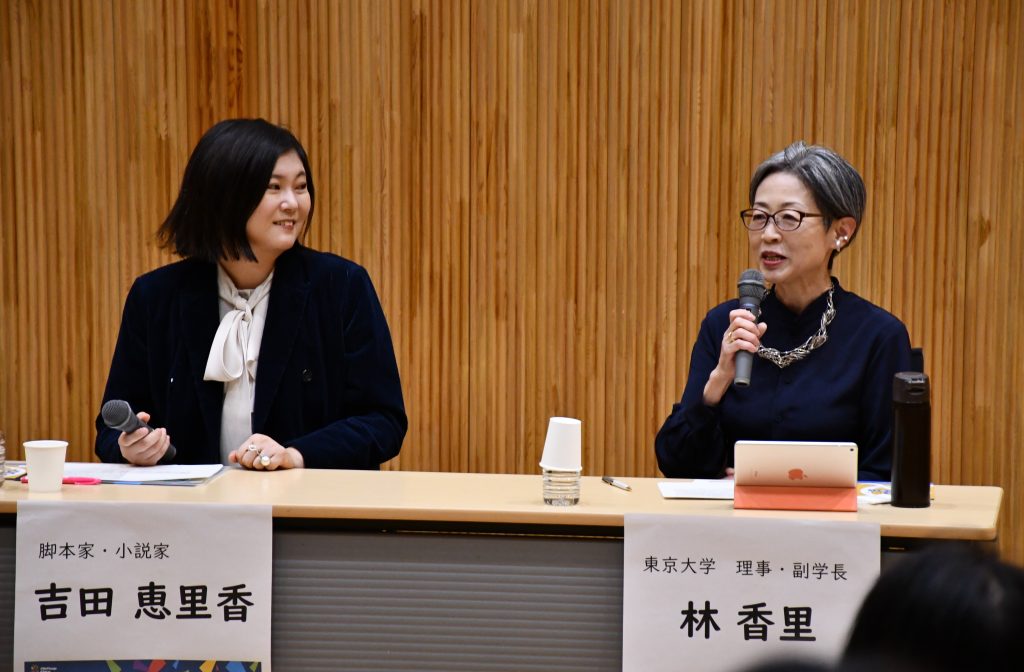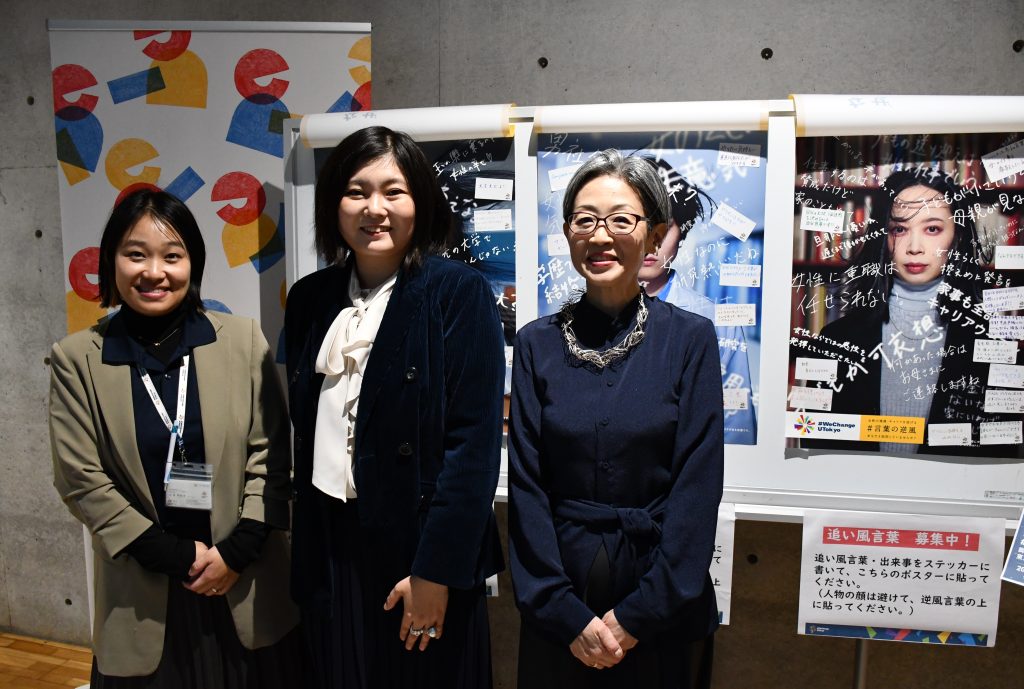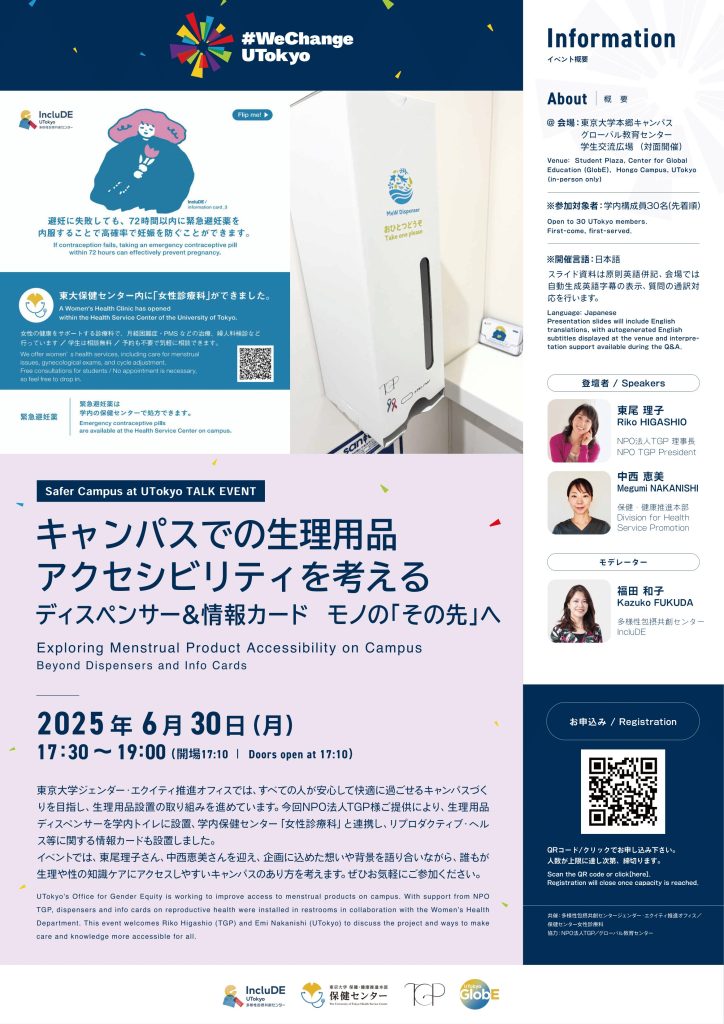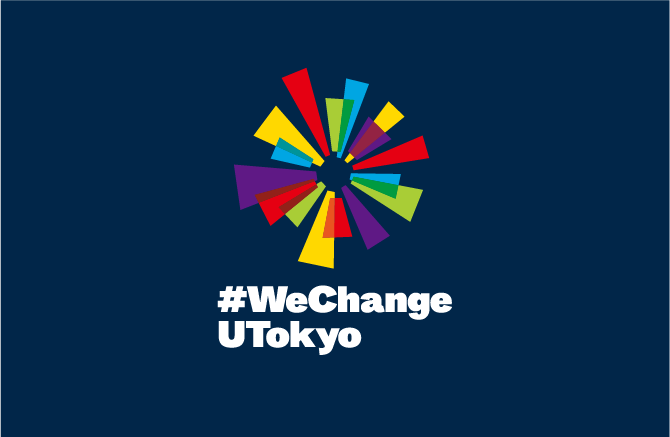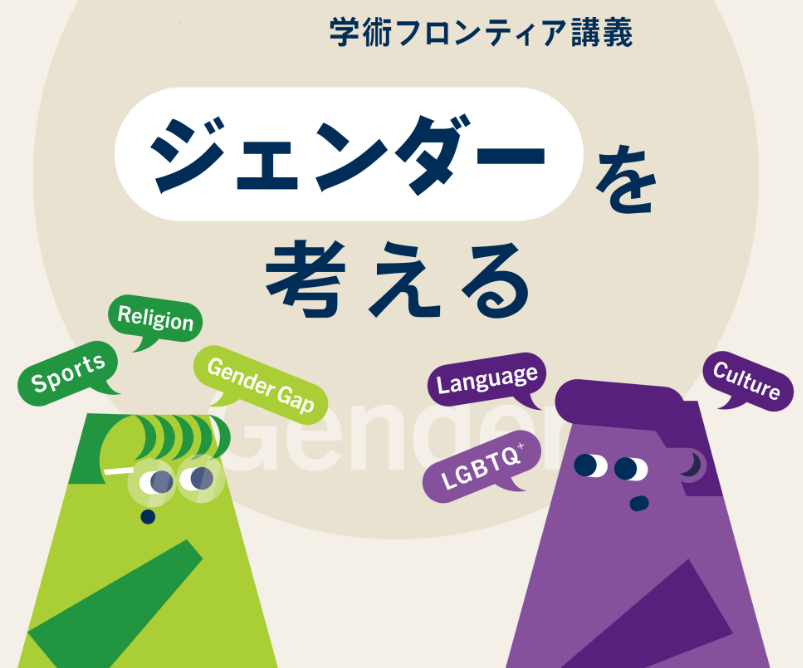On Wednesday, December 4th, 2024, the University of Tokyo’s Office for Gender Equity (IncluDE) held the event “To Confront #Headwinds: Dialogue Event with Erika YOSHIDA and Kaori HAYASHI” at the Fukutake Hall, the University of Tokyo. Approximately 110 people interested in gender issues attended the event. Asuka ANDO, Project Researcher at the Office for Gender Equity, who is also in charge of the “#Headwinds” project, served as moderator. An excerpt from the discussion appears below.
About the “#Headwinds” project
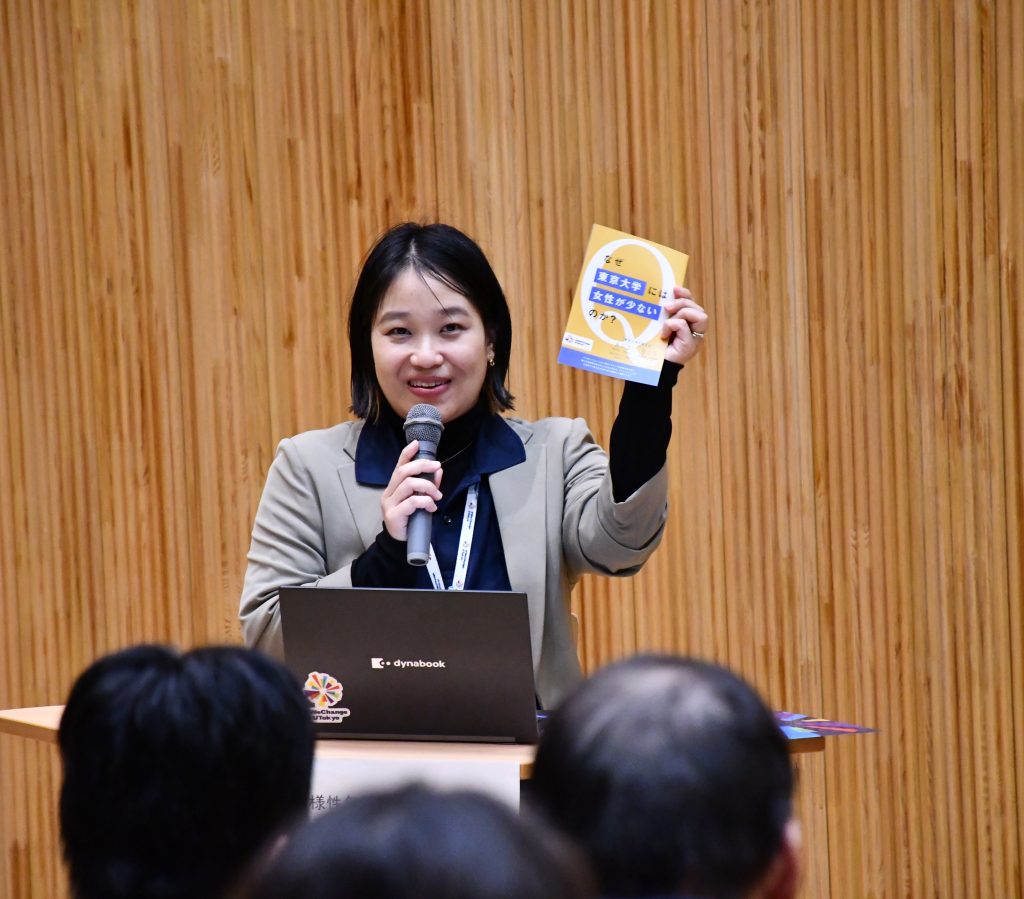
ANDO: The “#Headwinds” project was aimed show in visual form the words that women have been subjected to and the barriers they face. Within the framework of the “#WeChangeUTokyo” project, the “#Headwinds” project aimed to raise awareness among members of the University of Tokyo. As an executive, what were your expectations for this project? (An overview of the “#Headwinds” project is at https://wechange.adm.u-tokyo.ac.jp/en/news/304/)
HAYASHI: We aim to share the awareness of all members of the university that it is important to create diversity on campus. As one measure, we created the “#Headwinds” posters. You may think that it would be embarrassing for the University of Tokyo display those harsh words. However, this should not be considered shameful for the University of Tokyo; rather, it is something that everyone should be aware of in order to create a place for education and research in which everyone can play an active role for the future of Japanese society. It is also worth mentioning that we all worked very hard to build a consensus within the university that this is an important endeavor. In fact, after we put up the posters, many people inside and outside of the university sympathized with us, and I am very glad we did this campaign.
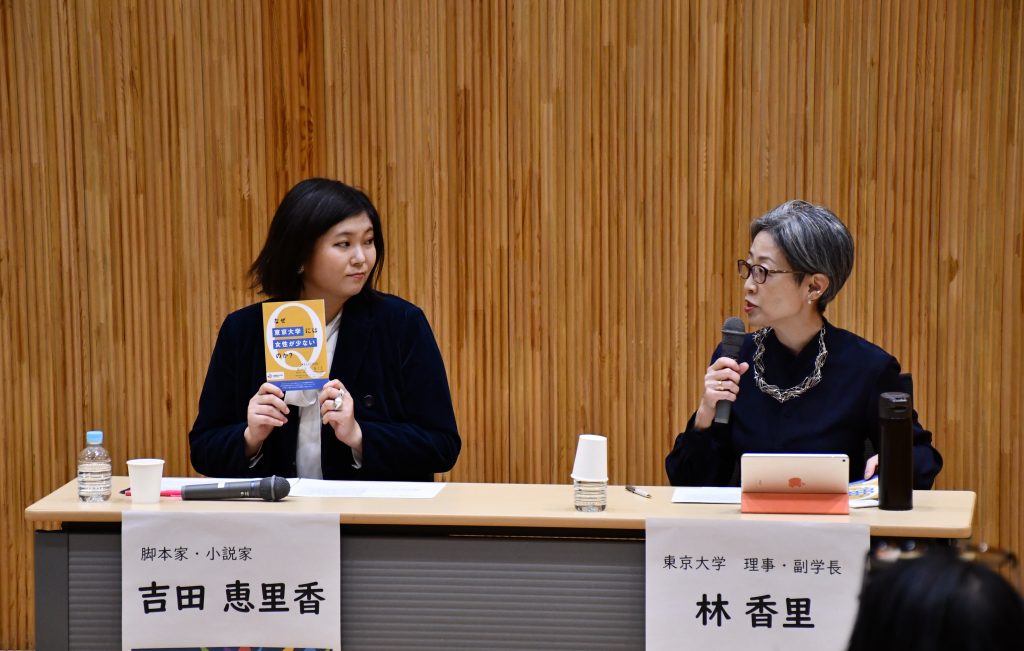
ANDO: How did you feel about the words on the posters?
YOSHIDA: I think that there is not a single woman who has grown up without being subjected to any of those words, which I find very upsetting. I myself strongly feel that, in my own work, I want to convey the message that it is okay to be angry at those words and to feel that they are wrong, so I was very encouraged to see that there are people who are also fighting against them.
Similarities between “#Headwinds” project and the TV drama Tora ni Tsubasa (The Tiger and Her Wings), and memorable scenes from the program
ANDO: I believe that the drama and the project have something in common in that they show the difficulties that women face in their lives from the past to the present. When you were writing the screenplay, was there any overlap with your own experiences?
YOSHIDA: I tried to make the story as wide-ranging as possible and reflect the words and wounds suffered not only by women but also by men. But I think an overlap occurred when the main character Torako found out she was pregnant. When I myself learned that I was pregnant, I had complex feelings, with people calling me “the baby’s mom,” not my name. I was very happy to become a mother, but at the same time I felt a bit bewildered and sad when someone called me “the baby’s mom.” Looking back, I think that part of the story reflected my own feelings.
ANDO: I also empathized when I watched that scene. I myself have a child, and I also understood how references to me changed when I became pregnant. Do you have any memorable scenes or lines from the drama?
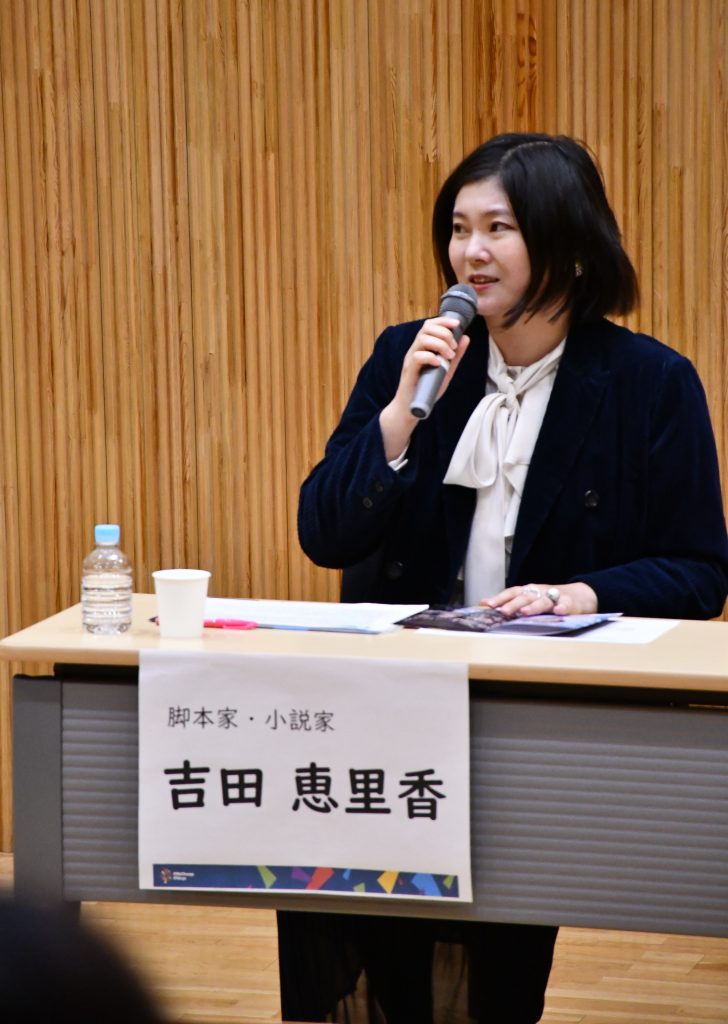
HAYASHI: That line from the celebration party—“We are extremely angry”—was very moving.
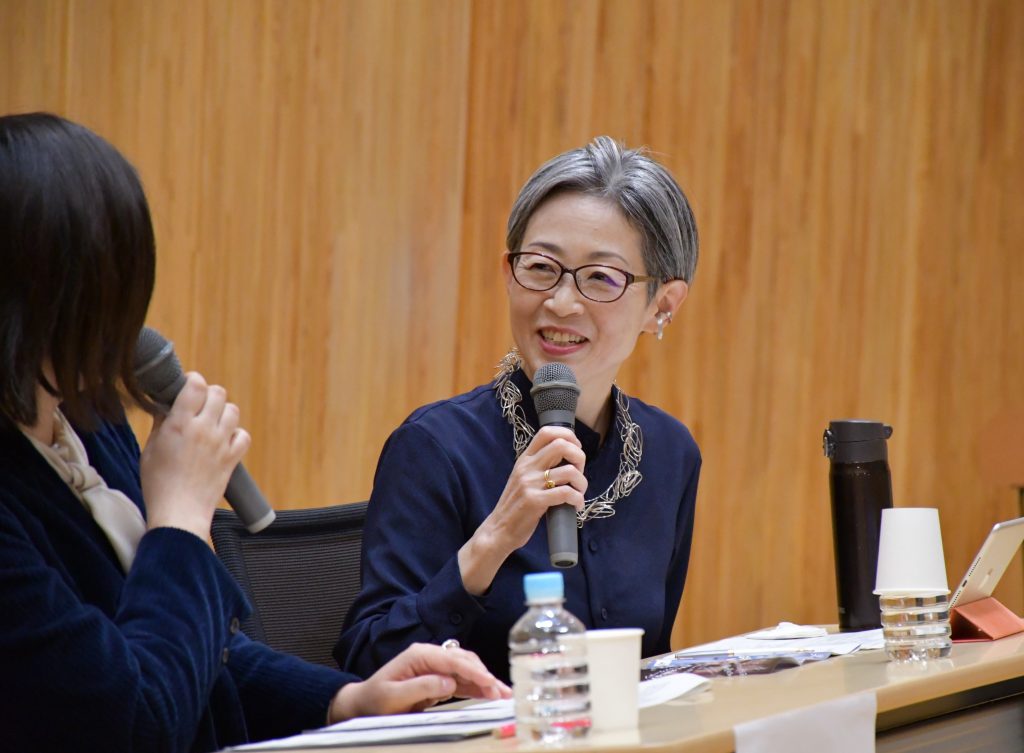
高等試験に合格しただけで自分が1番だなんてとても口が裂けても言えません。心半ばで諦めたと学ぶこともできなかったその選択肢すら知らなかったというご婦人を見ることを私は知ってるんですから。 でも合格してからモヤモヤ知ってるものの答えがわかりました。 私たちすごく怒ってるんです。この社会で何かの1番になりたい、そのために良き弁護士になるよう尽力します。 困った方を救い続けます。男女関係なく…
Kōtō shiken ni gōkaku shita dake de jibun ga ichiban da nante totemo kuchi ga sakete mo iemasen. Kokoro nakaba de akirameta to manabu koto mo dekinakatta sono sentakushi sura shiranakatta to iu gofujin o miru koto o watashi wa shitteru n desu kara. Demo gōkaku shite kara moyamoya shitteru mono no kotae ga wakarimashita. Watashitachi sugoku okotteru n desu. Kono shakai de nanika no ichiban ni naritai, sono tame ni yoki bengoshi ni naru yō jinryoku shimasu. Komatta kata o sukui tsuzukemasu. Danjo kankei naku…
The story is about a woman, but it’s also a story about everyone in society, and the message of creating a society that makes life easier for everyone was expressed by that line. I have another favorite line, the one that that Yūzo (Torako’s husband) says to Torako when he leaves for war:
トラちゃんが僕にできることは謝ることじゃないよ。 トラちゃんができるのはトラちゃんの好きに生きることです。また弁護士をしてもいい、別の仕事を始めても良い、優未の良いお母さんになってもいい。 僕の大好きな、何かに無我夢中になってるときのトラちゃんの顔をして、何かを頑張ってくれること、いや頑張らなくてもいい。トラちゃんが後悔せず心から人生をやりきってくれること、それが僕の望みです。
Tora-chan ga boku ni dekiru koto wa ayamaru koto ja nai yo. Tora-chan ga dekiru no wa Tora-chan no suki ni ikiru koto desu. Mata bengoshi o shite mo ii, betsu no shigoto o hajimete mo ii, Yūmi no ii okāsan ni natte mo ii. Boku no daisuki na, nanika ni mugamuchū ni natteru toki no Tora-chan no kao o shite, nanika o ganbatte kureru koto, iya ganbaranakute mo ii. Tora-chan ga kōkai sezu kokoro kara jinsei o yarikitte kureru koto, sore ga boku no nozomi desu.
HAYASHI: That one always makes me cry just remembering it. Of course it is a woman’s story, but there are always men who support women. It’s not only women who help women: there are also men who help and encourage them. It is very important for both men and women to build a good society together, and for that reason it is also very important to have men who support them. Of course, women also support women and men. I like this drama because it promotes mutual support regardless of gender.
YOSHIDA: When writing about gender equity, advocating for only one side will only create separation. I believe that improving women’s rights doesn’t take away men’s rights. In fact, the synergistic effect will raise both sides. That is why I am very grateful that you picked out those two scenes, because I wrote them with the hope that they would express something that is not distinguished by gender. Thank you very much.
HAYASHI: I have a question for you, Ms. Yoshida. How did you come up with the line “はて (Haté)” or “Really?” ? It is a good word, isn’t it?

YOSHIDA: I thought that softness was the most important thing. I know I say this a lot, but I don’t want to create a separation or deny anyone out of hand. I want to have a dialogue and create a chance for both of us to know that there should be a solution, or that there is such a way of thinking, or that this might hurt someone else. I am never 100% right, so in that case, let’s have a dialogue. You can say “I am angry now” or “I am not convinced” or “I don’t understand what you mean.” When you are in that kind of situation, the first thing you say is “はて?”. Also, I tried to show that it is okay for everyone to be angry. I picked the short word to use as a signal for that.
HAYASHI: I think it is wonderful. I think it’s great that I can just say “はて?” once to calm down and then we can start the conversation.

ANDO: I have told myself “はて?” many times. We also received many comments during the “#Headwinds” project that women realized that it is okay to be angry. In that sense, this project has a high affinity with Tora ni Tsubasa. Without intending to do so, we were able to carry out this project at a time when that drama was on the air, creating a synergistic effect. We are very grateful for Tora ni Tsubasa in that sense, too.
Significance and difficulty of promoting gender equity
ANDO: I believe that you two have been communicating gender-related issues in your respective fields, in academia and university administration, and in the field of entertainment. Could you tell us about the difficulties you have experienced?
YOSHIDA: The first question is why some people feel uncomfortable with gender-related topics. I believe that problems are not accessible to everyone in the first place because that issue is left unaddressed. Who feels uncomfortable when people talk about it? And who raises an eyebrow? Do I really need to care about the people who come to mind when I think about this? I try to think about this when I send out messages.
HAYASHI: Without recognition of the current state of gender inequality, women’s status, way of life, and rights are at a disadvantage, and the conversation will turn to why women alone are given preferential treatment, reverse discrimination, and so on. In fact, we sometimes receive such comments. I believe that people need to understand that the current situation is unfair, and that we are all trying to correct it and create a better society. The difficulty lies in the fact that it is not easy for people to understand this. It is difficult to convey a message that reaches people who do not share the same awareness. There are many ways to do this, including those that have a strong impact and those that are entertaining, and the Gender Equity Office is working on a variety of ways to do this. I feel that the most difficult thing is to reach the people who are not aware of this inequity.

YOSHIDA: I think it is very problematic that people do not even talk about what causes such difficulties of life or inequality. With the current economic recession and the various inequalities, everyone is feeling that they are disadvantaged in some way, and this feeling of not being able to care for others, or of being too occupied with one’s own needs, often escalates in a different direction. I am always struggling with where to begin in my stories as well.
HAYASHI: I specialize in journalism and media studies and have been a critic of the depoliticization of entertainment in Japan. I have also written articles on the stereotypical division of male and female gender roles portrayed in the media. I am, in fact, critical of Japanese TV dramas. However, I was impressed that your NHK TV drama series, which is very prominent among Japanese TV dramas, included controversial political themes. It is also entertaining in a nonintrusive way. Korean dramas address social issues, but in Japan it has been difficult to achieve this. But I have the impression that Tora ni Tsubasa addresses those issues head-on. But I have one complaint: six months is not enough!
YOSHIDA: Thank you very much. I also hope that other people will try to delve deeper into the themes covered in the drama.
For the future society
ANDO: Thank you both very much. As a final question, I would like to ask what kind of society you want to see in the future? And what can individuals, including others who are here today, do to help realize that vision? Please let us know your thoughts on these questions.
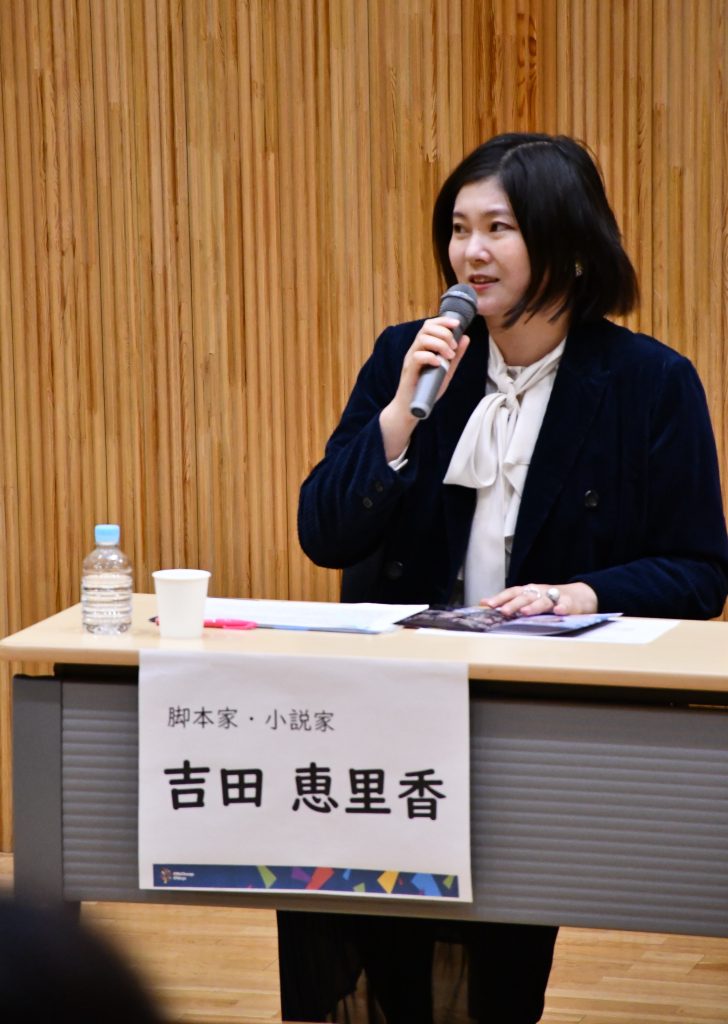
YOSHIDA: Through this drama, I realized that what I had taken for granted and thought I didn’t have to say was still not widely accepted by the public. That is why I was very often stuck in the preliminary stages talking about various inequalities, not just about gender. Of course, the most important thing is to have an equal society and a peaceful society without war, but we live in a frightening world where such things are now said to be too beautiful or too idealistic. Even if people think that I repeat the same thing over and over again, I would still say, “Discrimination is wrong.” I think the only thing we can do is to say the obvious over and repeatedly, starting with “No, you can’t discriminate.” I try to participate in events and be interviewed as much as possible for that reason.
HAYASHI: To help in any way, to bring us closer to a society that is diverse and inclusive, a society where all people can participate and develop their abilities, and to create a good place for education and research within the university—this is the work that I am doing. This is my passion, my mission, what I am trying to do. When I was living in Germany for research with my child, I asked a single mother who was from Eastern Europe and had struggled a lot in Germany to babysit my child. When I thanked her for her kindness, she told me, “No. While I am happy that you said thank you to me, you don’t have to thank me for what I did. Just pass it on to the next generation.” I am sitting here because I have received help from many people, and now I want to return the favor to the younger generation.
ANDO: Thank you. How about you, Ms. Yoshida?
YOSHIDA: As I am getting more chances to be in the public eye, I am trying to be careful not to resolve my work in an emotional way or to make it too neat and tidy. But as a writer, I tend to want to make it look neat and tidy, or to raise the level of perfection. In the midst of these daily struggles, I am given a ticket to write, and as long as I have that ticket, I have to do my best. Yet, there are times when I feel like I might get discouraged or want to run away. At those times, I try to encourage myself by thinking that I might represent an option for others. As Professor Hayashi said, I hope I can do something to expand the range of options for the next generation. I tell myself that it is okay to be a nagging scriptwriter.
Message for the audience
ANDO: Lastly, please give a message to our wonderful audience.
YOSHIDA: Thank you very much for this valuable opportunity today. I have read the list of questions in advance, and I am sorry to be so presumptuous, but I feel hopeful that there are so many people like me who want to make society a little better and are wondering what they can do to make that happen. The questions were all very encouraging. For a better society, I would like to do as much as I can in my scripts, novels, and stories, while keeping my heart unbroken. It is wonderful that we have so many allies. And to the mothers here, I know it was hard to stay standing up. Thank you for your babies, too.
HAYASHI: Ms. Yoshida, thank you very much for coming to the University of Tokyo. I am very happy to learn that such a person wrote the script for Tora ni Tsubasa and that her motivation was to raise issues to society. I have learned from your talk today that it is this kind of motivation that makes interesting dramas possible. As a university educator and a media researcher, I have learned a lot from this talk. And as I mentioned earlier, I am glad to see so many people here today, men and women, and children as well. I think it is the power of Tora ni Tsubasa to fill a venue like this. I myself have a moment once every three days or so when I think, “We’re screwed.” But now I feel a little more optimistic about Japanese society, and I am determined to do my best from tomorrow onward.
